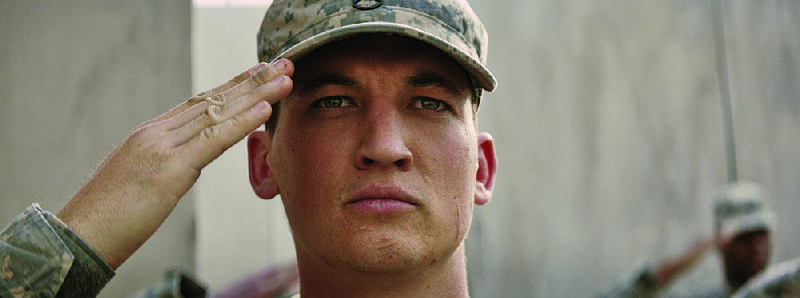War films don't have to concentrate on combat to be harrowing. Case in point: Jason Hall's affecting drama depicting the emotional turmoil suffered by several Iraq War veterans upon their return home. Based on David Finkel's acclaimed 2013 nonfiction book, Thank You for Your Service turns a spotlight on the post traumatic stress disorder that afflicts so many veterans of America's longest war. Considering that there seems to be no end in sight of the country's involvement in the Middle East, the film proves timely and affecting.
The film marks the directorial debut of Hall, who traversed similar dramatic territory with his screenplay for Clint Eastwood's American Sniper. He has winnowed the book's many subjects -- soldiers of the 2-16 Infantry Battalion -- into a handful, including Adam Schumann (Miles Teller), who returns home to his loving wife, Saskia (Haley Bennett), and two young children; Tausolo Aieti (Beulah Koale), or "Solo," a soldier of American Samoan descent suffering the effects of a brain injury; and Will Waller (Joe Cole), who comes home to find his fiancee (Erin Darke) gone and his home stripped of furniture.
Thank You for Your Service
88 Cast: Miles Teller, Haley Bennett, Joe Cole, Amy Schumer, Beulah Koale, Scott Haze, Keisha Castle-Hughes
Director: Jason Hall
Rating: R
Running time: 1 hour, 48 minutes
Upon arriving at the airport, Adam is approached by Amanda (Amy Schumer), the widow of a fellow soldier, who begs him to tell her the circumstances of her husband's death. He tells her that he wasn't there when it happened, although the pained look in his eyes signifies that there's more to the story.
Thank You for Your Service (also the title of a 2016 documentary focusing on the appalling paucity of mental health care for veterans) approaches its powerful subject in admirably understated fashion. Although it contains melodramatic elements -- such as when Waller confronts his fiancee at the bank where she works, and Solo falls in with a gang of criminals led by a fellow veteran (Omar J. Dorsey) -- it mainly concentrates on the bureaucratic frustrations faced by the men who are barely able to contain their raging emotions. One of the film's most vivid sequences simply depicts Adam endlessly waiting in a VA facility, surrounded by fellow vets in a queue that numbers in the triple digits.
Among the wartime incident haunting Adam is one depicted in the film's opening minutes, in which he desperately tries to help a fellow soldier, Emory (Scott Haze), who has been shot in the head by a sniper while patrolling a roof. Adam carries Emory down flights of stairs, only to drop him when he begins choking from the blood gushing from his friend's wound. "I can still taste the blood," Adam says at one point. Solo, too, feels a deep sense of guilt over not saving a soldier from a burning Humvee because he forgot he was there.
The film doesn't vilify the military, although it does include an encounter between Adam and a gung-ho colonel who's oblivious to the obvious emotional pain of the man standing right in front of him. The people working at the VA facility, including a therapist who takes time from her lunch to meet with Adam, are depicted as caring and attempting to be helpful. But they, like everyone else, are simply overwhelmed by the sheer volume of cases before them. The point is certainly made that much more needs to be done, that more resources need to be allotted, but the message is conveyed rather than preached.
The most effective sequences are the most quietly believable. Lying in bed with his infant son on his chest, Adam falls asleep and turns over, the baby dropping to the floor and screaming. Finally summoning up the courage to go see Emory, who survived his injuries, Adam discovers that the former soldier has an inspiringly positive attitude about life despite his physical disabilities.
There are times when the film feels unsubtle in its approach, such as when Solo suffers a flashback while playing a war-theme video game and becomes violent, deeply frightening his pregnant wife (Keisha Castle-Hughes). And when he rescues a pit bull that has been severely injured in an underground dogfight, the word "symbolism" might as well be emblazoned on the screen. But those moments are thankfully few and far between.
Teller, continuing his streak of strong dramatic performances that include Whiplash and Bleed for This, delivers a powerful turn that is all the more effective for its restraint. Never succumbing to histrionics, he conveys his character's desolation with haunted eyes and stiff physicality. The supporting performances are effective across the board, with Koale making a vivid impression as the despairing Solo, and Cole and Haze making the most of their relatively brief screen time. Bennett and Castle-Hughes are also solid as the wives, both supportive and fearful of their emotionally damaged men. The casting of Schumer, however, feels like a misstep. While the actress handles this rare dramatic role in unimpeachable fashion, she's simply not given enough screen time to make her appearance rise above the level of distraction.
That the end credits are accompanied by a downbeat new song written and performed by Bruce Springsteen seems apt, although a little too on the nose.
MovieStyle on 10/27/2017

